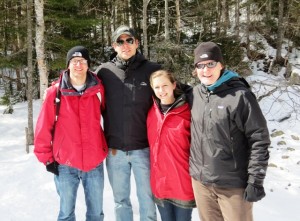Jaclyn White ’13 (Clarksboro, N.J.) and Chris Kelly ’13 (Boyertown, Pa.) recently presented their honors thesis research at the 48th Annual Meeting of the Northeast Section of the Geological Society of America in Bretton Woods, N.H.

Chris Kelly ’13 (left-right), Professor David Sunderlin, Jaclyn White ’13, and Professor Kira Lawrence
White, a geology major, focused her research on fossil wood preserved in the sediment of Alaska 55 million years ago to interpret what the ancient Alaskan paleoenvironment would have been like when the wood was alive and growing. She compared the growth patterns of the fossil wood that she collected in Alaska to those of the modern wood that she gathered from some trees along the Delaware River Valley. The similarities she encountered between the two types of wood gave her the data she needed to make her interpretations.
White had been to Alaska before on a research project with her adviser, David Sunderlin, assistant professor of geology, and was familiar with its geologic history. She had been especially impressed by the abundance of fossils.
“It seems natural to me to examine wood growth in order to determine ancient climate conditions, but no one had examined it before for these implications,” she says.
Southern Alaska, according to prior fossil studies of leaves, experienced a warm and wet climate (similar to the modern mid-Atlantic region) 55 million years ago. Through her study of the growth rings of the Alaskan fossil wood, White found that the climate conditions of the early spring and winter months were harsher than that found in the mid-Atlantic region, but that the climate conditions of ancient Alaska were likely similar to what modern trees in the mid-Atlantic region experienced during the late summer months in precipitation, nutrient availability, and temperature.
These findings are important because they provide the seasonality of Alaska 55 million years ago, and not just the average temperature and precipitation. Presently there is no analogue of such environments at high latitude.
According to White, as future climate models suggest a significant warming trend in higher latitudes, it is important to understand how increased temperature and precipitation will affect high-latitude ecosystems.
Kelly, a double major in geology and international affairs, has found his niche in the geoscience field of climate research. His research explored the climatic evolution of the South Atlantic Ocean throughout the past 10 million years. He and his adviser, Kira Lawrence, assistant professor of geology, used a geochemical analysis technique involving the algae that lived at the ocean surface to estimate past ocean surface temperatures.
Kelly, who also worked through the EXCEL Scholars undergraduate research program with Lawrence, was interested in investigating the climate of the earth at this time because the earth was considerably warmer than it is now.
“This time period could provide a possible analogue for the climate state towards which we are headed due primarily to modern human-induced climate change,” he says.
Both White and Kelly found the conference experience both invigorating and invaluable. They not only gained the necessary experience of presenting their research to established scientists in their respective fields, they also felt their passion for their chosen academic pursuits rekindled.
“It was exhilarating to meet other geoscientists, talk with them, and brainstorm collectively to improve our respective projects,” says Kelly.
After Lafayette, White plans to attend graduate school at the University of Connecticut conducting research and writing a thesis. Kelly has received a Fulbright Scholarship to conduct sea level research in Durban with Andy Green at the University of KwaZulu-Natal, off the coast of South Africa.

2 Comments
Jacqui White shows the same intensity in her academic work that she showed on the field hockey turf for our nationally ranked team. Best of luck in your graduate studies, Jacqui!!
Nice research with interesting results. Once more “The present is the key to the past” triumphs. My compliments to White, Kelly, and both of their mentors.
Comments are closed.